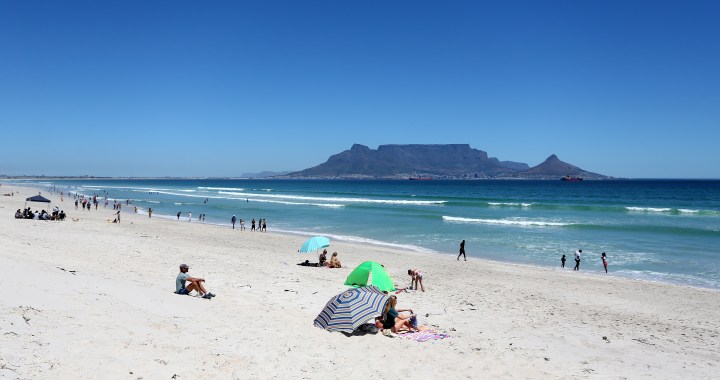RISING SEA LEVELS
Bloubergstrand Beach outside Cape Town could lose its shoreline by the end of the century

Bloubergstrand Beach, a favourite among locals and tourists for its iconic view of Table Mountain, stands to lose more than 100m of its sandy shoreline by the end of the century.
Cape Town’s iconic Bloubergstrand Beach was recently listed as the ninth tourist beach in Africa predicted to shrink the most by 2100. This is according to visualisations by HawaiianIslands.com, based on data from the Joint Research Centre of the European Commission, estimating global shoreline changes to illustrate which tourist beaches will shrink the most by the end of the century.
The study states that sandy beaches occupy more than one-third of the global coastline and have high socioeconomic value related to recreation, tourism and ecosystem services, while also providing coastal protection from marine storms and cyclones.
However, a substantial proportion of the world’s sandy coastline is already eroding and being affected by rising sea levels – and this situation could be exacerbated by climate change.
While Bloubergstrand Beach stands to lose about 112.1m of its shoreline, Landmark Beach in Lagos, Nigeria, could recede by almost a kilometre, losing 918.3m of shoreline – more than any other tourist beach in the world.
HawaiianIslands.com used European Commission data that estimates how shorelines worldwide will change by 2100 to calculate the average change in metres of shorelines at the 10 most-reviewed beaches on Tripadvisor in each country. It then used these figures to identify the 20 tourist beaches worldwide, and 15 on each continent, that will change the most by 2100.
Beach shrinkage in the Cape
This is not the only Cape beach that has recently been identified to be significantly affected by erosion. A study published in January 2023 found that 16 Mile Beach in Yzerfontein, Western Cape, is rapidly eroding with a notable section already disappearing.
Lead author of the study, Jennifer Murray from Wits University’s School of Geography, Archaeology and Environmental Studies, and her research team made the finding by monitoring shoreline changes along the southwestern coast of South Africa over the past 83 years in response to the rapid erosion of sandy beaches worldwide.
“Although sea level rise is commonly talked about with climate change, it should really be more about changes to the entire ocean system, like currents and how changes to sediment movement affect the amount of sand across our beaches,” she said.
Their study states that coastal erosion is increasingly becoming a public issue and is no longer just a problem for coastal managers; instead it is a universal problem that affects almost every country with a coastline.
“The consequences of coastal erosion include loss of life, disruption of economic sectors and degradation of coastal ecosystems and biodiversity. Therefore, to protect coastal infrastructure and its socio-economic potential, it is necessary to monitor coastal areas actively and evaluate their time-space patterns.
“While coastal erosion is exacerbated by climate-driven sea level rise and anthropogenic forces, the extent and severity vary from region to region,” the study says.
Read more in Daily Maverick: How rising sea levels may impact Durban and Cape Town
Dr Mary Evans, co-author and senior lecturer at the Wits School of Geography, Archaeology and Environmental Studies, adds that the rise in sea level stems from thermal expansion as the sea surface temperatures increase. Increased temperatures will also lead to glaciers and ice caps melting.
She agrees with Murray that the impacts of this on coastlines will depend on the coastal dynamics of the region – some coastlines may be exposed to storm surges which could erode dune barriers, as was the case in Yzerfontein, whereas other beaches may be protected by natural barriers and could be less affected.
“The reduction in beach width may not have an immediate impact but is a cause for concern. Coastal management needs to be vigilant and responsive to the changing dynamics of coastal zones. Homes and hotels built on beachfronts 20 years ago may not be as safe now,” she said.
The paper by the European Commission states that the aim of the discussion “was to give a socio-economic dimension to their findings, given that many popular sandy beaches worldwide have even less than 100m of available accommodation space at their backshore. Human encroachment in coastal zones and backshore developments have limited the space for shorelines to retreat into, and recent global studies on shoreline change highlight that many of the major transitions are due to human interventions”.
Therefore, human intervention is required to mitigate the effects of climate change and sea level rise.
Anton Cartwright, International Intergovernmental Panel on Climate Change author and researcher at the African Centre for Cities, wrote one of the first series of studies on the impacts of sea level rise on Cape Town.
“Sea level rise is the super-tanker of climate change. It is slow to start but will carry on long after atmospheric temps stop warming. The oceans will keep rising over the rest of this century. Up until now it has been mostly driven by thermal expansion of the ocean waters, but the rapid break-up of terrestrial sea ice has caught climate modellers off-guard and required upward revisions,” he said.
Cartwright says the tides, winds, swell and coastal topography all play a factor as well, and thus the impact is best studied locally.
“Beaches will suffer, for sure… I would not place much confidence in the 112m estimate. We have adaptation options, including beach thickening, kelp beds and reefs,” Cartwright says.
Impact of beach shrinkage on the tourism sector
This human intervention is possible if the relevant authorities get on board and engage with coastal businesses.
Some of the beachfront restaurants in Bloubergstrand spoke to Daily Maverick about the likelihood of the shoreline being lost by the end of the century.
Leon Reinders, the owner of Eden Café – a beach bistro where customers have a view of Robben Island and Table Mountain – said: “We are concerned. To put things into context, we had a major storm a few years ago in about 2016/2017 which eroded the beach.
“That impacted significantly on us because it completely changed the shape of the beach and took away a significant part of the dune… We transformed from one of the most popular kiteboarding beaches in the world to virtually having no business from kiteboarding.”
Reinders said it became very evident that erosion is not only affecting the beach, but also the walkways along the beach. He said while the issue was important, they had more immediate challenges such as load shedding.
Read more on Daily Maverick: Rising seas threaten to wipe out African coastal heritage sites
“Long term, we are all concerned about global warming and the changes to the beach… it is a major threat. Our location is 50m away from the shoreline and in elevation we are probably about eight metres above sea level.
“So there would have to be a significant sea-level rise for it to be a threat to us. It is a concern, but I cannot see that it will be a major threat in the next five to 10 years.”
Gabbie Katz, the owner of Catch 22, a restaurant on the beachfront, said there needed to be more awareness and engagement on the subject.
“People are aware of issues relating to the impact of climate change on the environment, but beach shrinkage and its impact on businesses in beachfront areas is not being discussed or even brought up by local or national government,” she said. DM
To read all about Daily Maverick’s recent The Gathering: Earth Edition, click here.




















Come on guys. I wouldn’t expect this claptrap from you.
Climate alarmism.
Go take a walk down memory lane the first recent prediction told us there would be no beaches by 2000. Then Al Gore said Miami would be under water by 2014.
In every case, the doomsday nonsense has been just that. Perpetuated by one sided nonsense reporting.
I expect more of The Maverick.
And your qualifications in climate prediction are…?
One doesn’t have to be qualified to read the IPCC reports. If one reads them rather than relying on alarmist articles for information and one ignores the reliance on RCP 8.5 in the IPCC reports then one finds that catastrophic outcomes are predicted for very far in the future if at all.
No qualifications necessary. But reading a 3,600 page report is beyond most people especially climate journalists.
Climate scientists have been predicting catastrophic rises in sea levels for the SA coast for as long as I can remember ( since the 1950’s if you must know!) and it just hadn’t happened! Apart from the odd storm and extremely high tide, things have pretty much stayed the same! Perhaps this is one disaster that SA will escape! One can only hope!
Its hard to believe that we still have climate denialists at this stage- after recording the hottest day globally – EVER!
It’s only the hottest day every if you’re a climate denialist. That claim comes from a computer model.
It does not come from actual historical temperature data. And the data dispute the hottest ever claim. Extreme heat has actually been declining over the last century. That’s what the data show.
That’s not what climate alarmism shouts of course but the facts actually speak for them selves.
Not a denialist at all – just telling you my very close observation regarding the level of the high water mark on the KZN coast. There is no denying that humans are in trouble thanks to our own pollution – the planet will continue and survive…just not with us on it!
It is so easy to put fear into people with predictions which more often than not never come to past. Mankind cannot and should not interfere with Nature. A prime example is the complaint about excess carbon dioxide but at the same time cutting down trees which need the carbon dioxide as does all plants which in turn release oxygen into the atmosphere. We interfere with Nature to our own cost.
More fear mongering. Don’t buy into it. It’s typical mainstream media sensationalism.